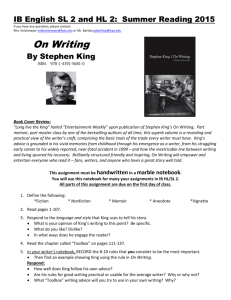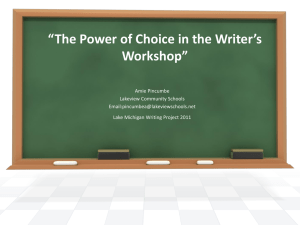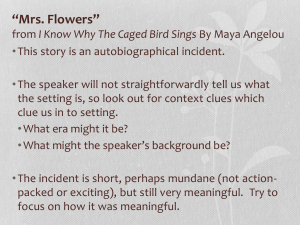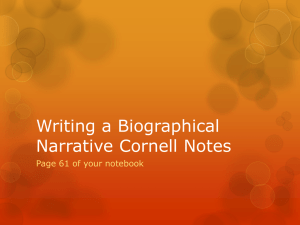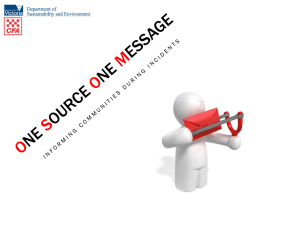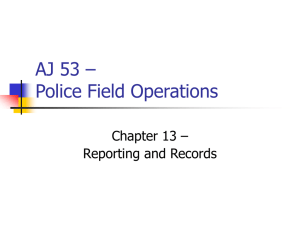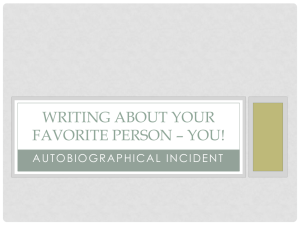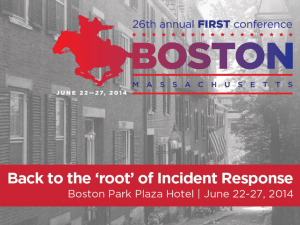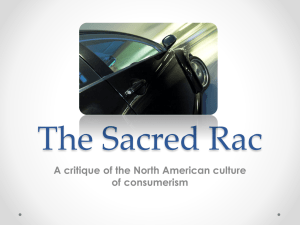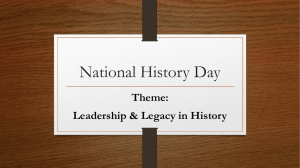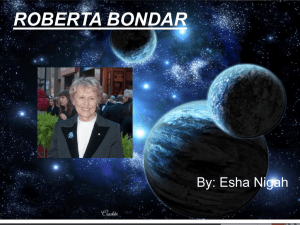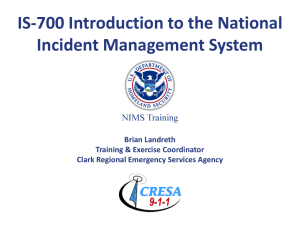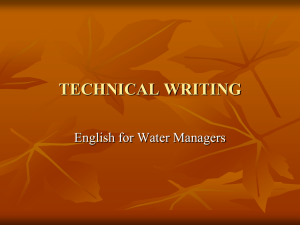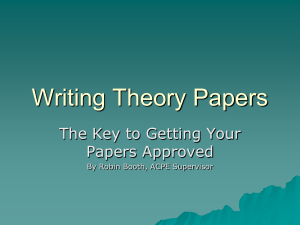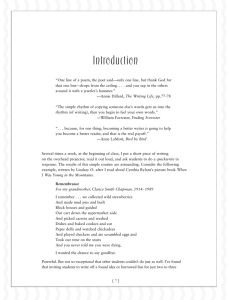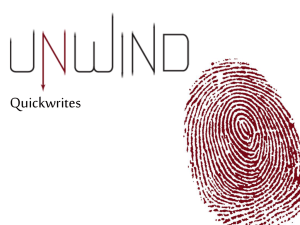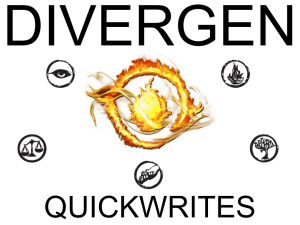1NarrativeEssay-RegularComp
advertisement
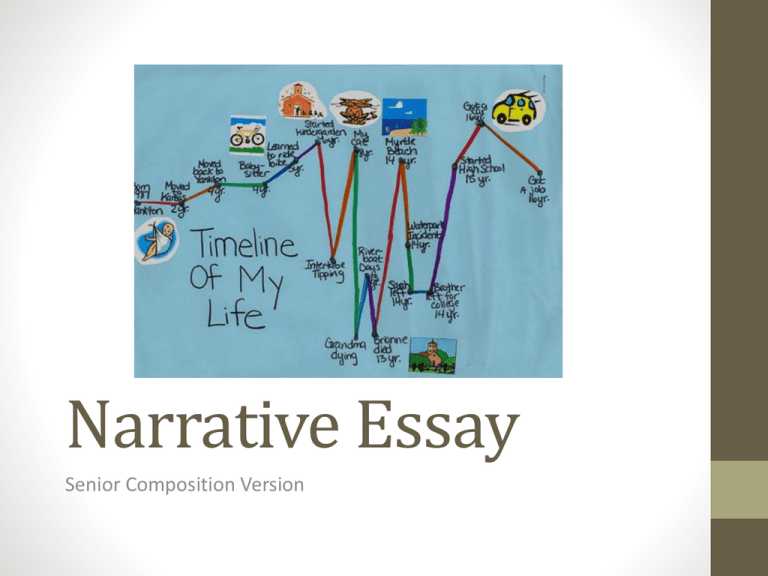
Narrative Essay Senior Composition Version • What has made me who I am today? • Where do I come from and where am I going? • What is most meaningful to me? • What events and experiences have been significant for me? The Assignment Narrative Essay • Write an essay about an event in your life that will be engaging for readers and that will, at the same time, help them understand the significance of the event. Tell your story dramatically and vividly. • 500 words minimum • Double space/12 pt font • Final draft needs to have an MLA heading Requirements The Basics • You remember the event well enough to tell the story. • The story lets your classmates learn something about you. Life is Drama! Look for Conflict! Important Writing Process • Model the process… • Quickwrites in your Writer’s Notebook • Notes about Profiles • Using exemplars to model… Timeline for Editing/Revision • Post to Turnitin • Complete Turnitin Peer Reviews • Read the reviews; • Plus/Delta + Paragraph • Correct and rewrite Ch. 2 St. Martin’s Guide • Final rewrite “Handed My Own Life” “On Being a Real Westerner” • Submit Final Copy in class with MLA heading “100 Miles per Hour, Upside • Reflect on the process Down and Sideways” “Calling Home” Others Guide to Writing Invention and Research • Finding an event to write about • Describing the place • Recalling Key People • Sketching the Story • Testing your choice • Exploring Memorabilia • Reflecting on the Event’s Significance • Defining Your Purpose for your Readers • Formulating a Tentative Thesis Statement Planning and Drafting • • • • Seeing what you have Setting goals Outlining Drafting What is a Narrative Essay? • Autobiography is so popular because reading as well as writing it leads people to reflect deeply on their own lives. • When you reflect on the meaning of an experience, you examine the forces within yourself and within society that have shaped you in to the person you have become. • Practice narration and description. • Writer must strive to enable readers to visualize the event(s) and people involved and connect the dots about why this was important. “When you write about a remembered event, your purpose is to present yourself to readers by telling a story that discloses something significant about your life.” St. Martins, 25 “Autobiographical significance…” • “Autobiographical writers do not just pour out their memories and feelings. Instead they shape those memories into a compelling story that conveys the meaning and importance of an experience---what can be called its autobiographical significance.” --St. Martins, 25 Brainstorming… Listing Remembered Events: • An occasion when you realized you had a special skill, ambition, or problem. • A time when you became aware of an injustice, selflessness, heroism, sexism, or racism. • A difficult situation, such as when you had to make a tough choice, when someone you admired let you down, or when you struggled to understand something hard. • An occasion when things did not turn out as expected, such as when you expected to be praised but were criticized or ignored, or when you were convinced you would fail but succeeded. • An incident charged with strong emotion, such as love, fear, anger, embarrassment, guilt, frustration, hurt, pride, happiness, or joy. • An incident that you find yourself thinking about frequently or one you know you will never forget. Brainstorming… Listing Events Related to Identity and Community: • An event that shaped you in a particular way or revealed an aspect of your personality you had not seen before, such as your independence, insecurity, ambitiousness, or jealousy • An incident that made you reexamine one of your basic values or beliefs, such as when you were expected to do something that sent against your better judgment or when your values conflicted with someone else’s values • An occasion when others’ actions led you to consider seriously a new idea or point of view • An incident that made you feel the need to identify yourself with a particular community, such as an ethnic group, a political or religious group, or a group of co-workers • An event that made you realize that the role you were playing did not conform to what was expected of you as a student, as a male or female, as a parent or sibling, as a believer in a particular religious faith, or as a member of a particular religious community • An incident in which a single encounter with another person change the way you view yourself… Brainstorming… Listing Events Related to Work and Career: • An event that made you aware of your capacity for or interest in a particular kind of work or career, or an event that convinced you that you were not cut out for a particular kind of work or career. • An incident of harassment or mistreatment at work • An event that revealed to you other people’s assumptions, attitudes, or prejudices about you as a worker, your fitness for a particular job, or your career goals • An incident of conflict or serious misunderstanding with a customer, fellow employee, supervisor, or someone you supervised Basic Features (p.48-49) • A Well-Told Story • Whatever else the writer may attempt to do, he or she must shape the experience into a story that is entertaining and memorable. • Build suspense and propel the narrative. • Use time markers and dialogue. • A Vivid Presentation of Places and People • Recreate the place and let us hear what people say • Use figurative language and specific details • An Indication of the Event’s Significance • Showing/Telling • Readers do not expect “thesis” at the beginning • Avoid adding lesson “like a moral tagged onto a fable.” Examples: • “Handed My Own Life” by Annie Dillard • “On Being a Real Westerner” by Tobias Wolfe • ”100 Miles Per Hour, Upside Down and Sideways” by Rick Bragg • “Calling Home” by Jean Brandt • http://bcs.bedfordstmartins.com/theguide9e/#588124__602741__ • http://content.bfwpub.com/webroot_pubcontent/Content/BCS_2/ax elrod_SMG_9E/Instructor%20Resources/Marriage%20101.pdf • (More exemplars here. Look at chapter 2.) Steps in the process Preparation • Setting up your Writer’s Notebook/Journal • Listing Events/Quickwrites Writing the Paper Create an attention-getting introduction that arouses curiosity Show the reader the “characters” involved, the conflict, the emotions. Think like a movie director: Which scenes do you really need to show what happened? (consider storyboarding) How will you capture your “frame of reference”? Consider a few choice items that epitomize the moment. Write a memorable conclusion with a strong CLINCHER Checklist Check spelling, punctuation, and subject-verb agreement Use “vivid verbs” instead of “to be” verbs Use only active voice Make sure all structures are parallel Use vivid, descriptive adjectives Ensure you have sentence variety: most sentences should be compound, complex, or compound-complex Avoid grammar errors Remember—This paper is not about you making unwanted self-disclosures…You choose the event to write about and decide how you will portray yourself. USE THE EXEMPLARS TO GIVE YOU IDEAS OF HOW TO TELL YOUR STORY. Getting Started… Use your Writer’s Notebook to explore various moments and events. • Don’t censor yourself. Your teacher will NEVER ask you to share something you are uncomfortable sharing. • Use the “Lists” from St. Martin’s • Use “Stones in the River” and “Life Maps” to get you started. • Quickwrites in class are just the start…. • USE YOUR WRITER’S NOTEBOOK! YOU WILL NOT BE FORCED TO SHARE WHAT YOU WRITE HERE. YOU WILL USE THIS TO EXPLORE THEMES/IDEAS TO FIND SOMETHING YOU ARE COMFORTABLE SHARING WITH THE CLASS (anonymously if you choose) FOR PEER REVIEW. • Today’s QUICKWRITE: “I REMEMBER…” Works Cited • http://mybabyphotos.net/wp-content/uploads/2009/02/alli-lifemap.jpg • http://schools.penncrest.org/staff/tdouglas/wpcontent/uploads/2009/08/memoir.jpg • http://www.cartoonstock.com/directory/m/memoir.asp
